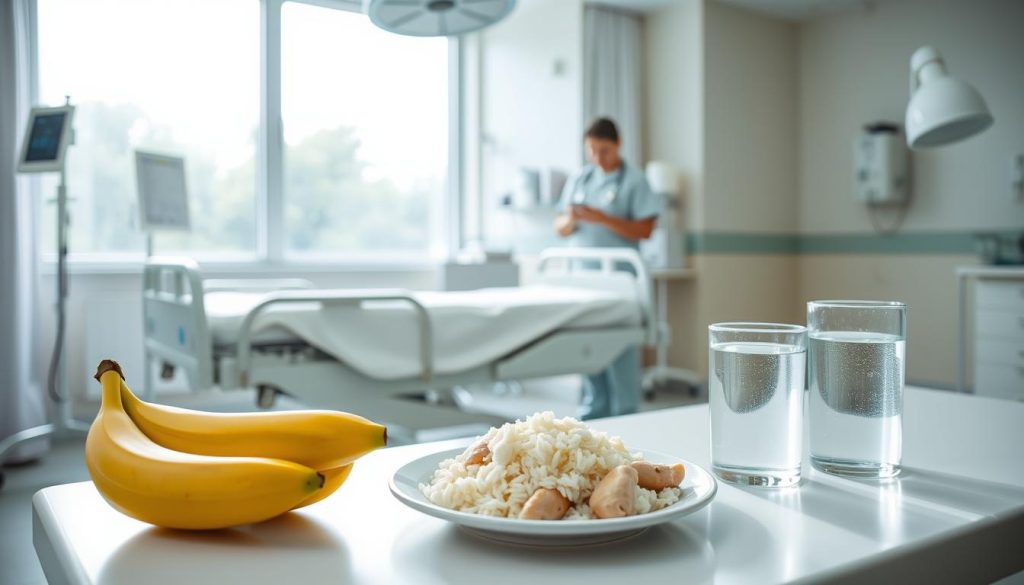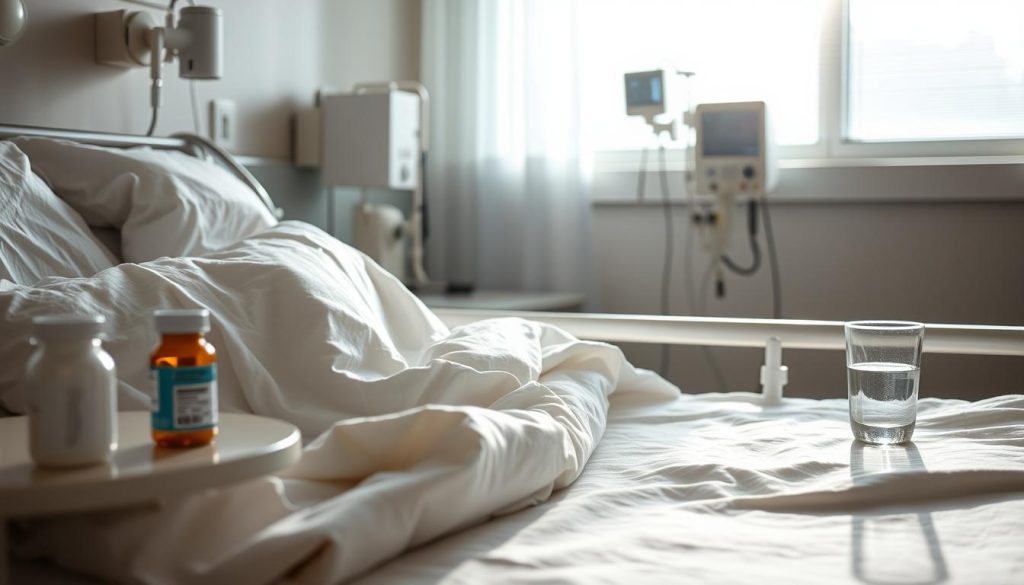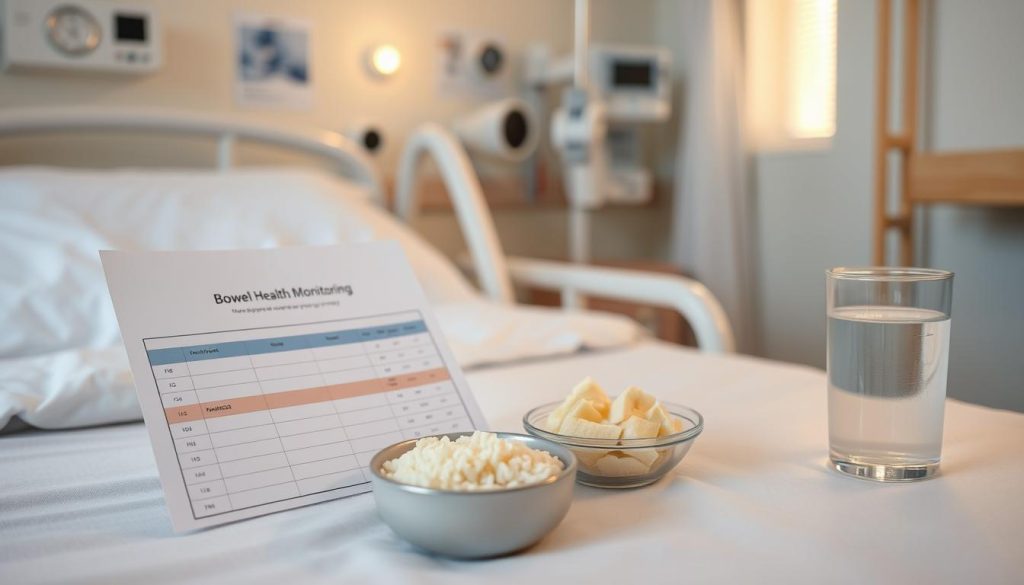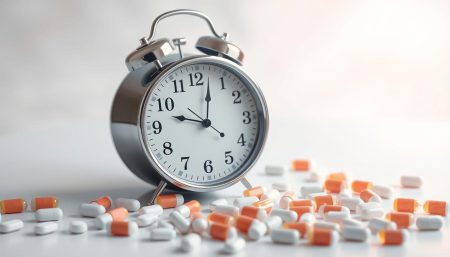Surgical procedures are often needed to improve health. But, it’s important to talk about complications of surgery diarrhoea before surgery. This is a key part of surgical recovery and diarrhoea care that needs quick attention. Starting your recovery journey, knowing about postoperative diarrhea is key. Diarrhoea after surgery can be uncomfortable and even cause big problems if not treated right away. This section will help you understand and manage this issue, making your recovery smoother.
Understanding Diarrhoea After Surgical Procedures
Diarrhea after surgery is common and can be unsettling. Knowing about it helps in managing and preparing for it.
Definition and Symptoms of Postoperative Diarrhea
Postoperative diarrhea means having frequent, loose bowel movements after surgery. Symptoms include more frequent and watery stools. It’s different from regular bowel movements because it starts suddenly and can cause other issues like stomach pain and urgency.
Common Causes of Diarrhea Following Surgical Intervention
Many things can cause diarrhea after surgery. Antibiotics can upset the gut’s balance. Surgery on the gut or reactions to anesthesia are also common causes. Stress and anxiety from the surgery can make it worse.
It’s important to have a plan for post-op diarrhea care. This can make recovery easier and improve how patients feel. Knowing what causes it helps in managing it better.
Assessing the Risks: Complications of Surgery Diarrhea
After surgery, patients might face diarrhea issues. This can affect their recovery and health. It’s important to know the risks of post-surgery diarrhea to treat it well and keep patients safe.

Dehydration and imbalances in electrolytes are big worries with post-surgery diarrhea. These can make patients weak, keep them in the hospital longer, and cause more health problems. Doctors need to watch these closely and treat them to balance fluids and electrolytes.
- Dehydration: Losing too much water through diarrhea can cause dehydration. It’s key to drink more water and, if needed, get IV fluids.
- Electrolyte Imbalance: Diarrhea can take away important salts and minerals. Doctors need to give supplements based on blood tests to fix this.
- Delayed Recovery: Diarrhea can slow down healing by causing nutrient loss and making patients more likely to get sick.
To lessen diarrhea’s effects after surgery, we need to act early. Treatment might include changing what you eat, taking medicine, and sometimes, more steps to find and fix the cause.
In short, treating diarrhea after surgery is vital to avoid problems and help patients recover better. It’s good for patients and doctors to talk about these risks and treatments before surgery.
Identifying the Types of Surgeries Prone to Post-Op Diarrhoea
Knowing which surgeries often lead to diarrhea after is key for patients and doctors. Gastrointestinal surgeries, for example, often cause diarrhea because they touch or remove parts of the digestive tract. We’ll look at how some surgeries and anesthesia can affect bowel movements.
Gastrointestinal Surgeries and Diarrhoea
Gastrointestinal surgeries deal with the stomach, intestines, and other digestive organs. These operations can upset the gut’s natural balance, mess with how it moves, and cause diarrhea. It’s important to understand these risks to manage diarrhea after surgery.
Post-Anesthesia Effects on Bowel Movements
Anesthesia is used in almost all surgeries and can slow down bowel movements, leading to constipation. But, as the body gets rid of the anesthesia, it can cause diarrhea as a rebound effect.
| Type of Surgery | Common Impact on Bowel Functions | Post-Op Diarrhoea Percentage |
|---|---|---|
| Colon Resection | Direct manipulation of bowel, removal of sections | 35% |
| Gastric Bypass | Altered gut anatomy and motility | 20% |
| Appendectomy | Minimal direct effects on bowels, possible postoperative infections | 10% |
| Hysterectomy | Indirect impact, stress on adjacent digestive organs | 15% |
Diarrhoea After Surgery: Causes and Prevention

It’s key to know how to stop diarrhoea after operation for those having surgery. Diarrhea after surgery is not just uncomfortable. It also slows down healing. So, it’s important to understand why it happens and how to stop it.
Diarrhea after surgery can come from many sources. It might be because of the surgery itself or the medicines used, like antibiotics. These can upset the balance of good bacteria in the gut. Also, what you eat and drink after surgery matters a lot.
- Hydration: Drinking enough water helps keep your intestines healthy.
- Diet Adjustments: Eating soft, simple foods can make digestion easier.
- Medication Review: Talk to your doctor about any side effects of your medicines.
Acting early can help a lot in stopping diarrhoea after surgery. Eating well and talking about medicine side effects with your doctor can help. These steps not only make you feel better but also help you heal faster. This means you can get back to your normal life sooner.
Management of Diarrhea Post Surgery: Early Intervention
Handling postoperative diarrhea starts with early steps. These steps help reduce discomfort and prevent serious issues. It’s important to follow these steps closely in the first days after surgery.
Immediate Steps to Take if You Experience Diarrhoea After Surgery
Right after surgery, it’s key to notice and act on diarrhea signs. Here are some steps to take:
- Drink lots of fluids, like electrolyte solutions, to stay hydrated.
- Ask your doctor before taking over-the-counter anti-diarrheal meds.
- Keep track of how often and what your bowel movements are like.
- Eat a bland diet to avoid foods that can upset your stomach.
When to Seek Medical Attention for Post-Surgical Diarrhoea
If diarrhea doesn’t get better with home care, see a doctor.
- Call your doctor if diarrhea lasts over 48 hours or gets worse.
- Get help right away if you show signs of dehydration, like not peeing much or feeling dizzy.
- Talk to your healthcare team about treatment options for post-surgery diarrhea that are right for you.
Acting fast is important in managing postoperative diarrhea. Use home remedies, meds, and doctor advice together.
Medication and Treatment Options for Post-Surgery Diarrhoea
Dealing with diarrhea post surgery requires different treatment options for post-surgery diarrhea. These include medicines and special treatments. It’s key for both patients and doctors to know about these drugs and how they help.

Doctors often give antibiotics, probiotics, and antidiarrheal drugs. Each one is important for managing diarrhea post surgery. They are chosen based on the patient’s needs and health:
- Antibiotics: Given if the diarrhea might be from a bacterial infection. It’s important to remember antibiotics only work against bacteria and should be based on test results.
- Probiotics: These good bacteria help fix the gut’s natural balance after surgery. Doctors often suggest them to help the gut during recovery.
- Antidiarrheal agents: Drugs like loperamide slow down the gut to reduce diarrhea. But, they should be used carefully because they can make things worse if there’s an infection.
For treatment options for post-surgery diarrhea, a plan that fits each person is needed. This plan is based on careful checks and watching how the patient does. It helps make symptoms better and speeds up recovery.
Putting these medicines into a full treatment plan is key. This plan also includes changing what you eat and drinking enough water. Doctors keep an eye on how well the patient is doing. They make changes to the treatment as needed.
The Role of Diet in Preventing Diarrhoea After Surgical Procedures
Managing your diet is key after surgery, to avoid diarrhea. Changing what you eat can help prevent stomach problems. It also helps you recover faster.
Recommended Foods and Fluids for Post-Op Recovery
After surgery, eat foods that are gentle on your stomach. These foods help prevent diarrhea:
- Lean proteins like chicken, turkey, and fish help your body heal.
- Well-cooked veggies like carrots, spinach, and squash are full of nutrients.
- Drink clear fluids like broths, herbal teas, and water to stay hydrated.
What Foods to Avoid to Minimize Risk of Diarrhoea
Stay away from foods high in fat and sugar to avoid diarrhea. Here are some foods to avoid:
- Avoid rich, oily foods and fried items to prevent bowel irritation.
- Some people find dairy hard to digest, which can lead to diarrhea.
- Artificial sweeteners in sugar-free gum and candies can also cause diarrhea.
Following these dietary tips can help manage diarrhea risk. Good nutrition is essential for a smooth recovery. It affects how quickly and well you heal.
Postoperative Care: Monitoring and Managing Bowel Health
Managing post-op diarrhea is key for a smooth recovery. It’s important for patients and caregivers to watch bowel health closely. They should know the difference between normal and abnormal bowel movements after surgery.

Healthcare experts say keeping a bowel movement log is helpful. This log should track consistency, frequency, and any symptoms like pain. This can show how well you’re recovering, as explained in this guide.
Red flags include persistent diarrhea, severe pain, and blood in the stool. These signs might mean you need urgent medical help. Knowing these signs is vital for good care and quick action when needed.
| Normal Bowel Movement | Abnormal Bowel Movement |
|---|---|
| 2-3 times per day | More than 5 times per day |
| Soft and formed | Liquid and unformed |
| Painless | Accompanied by severe pain |
Staying hydrated and eating well is important for recovery. Foods high in fiber and probiotics can help your bowel function return to normal. This can also help manage diarrhea.
- Hydration: Drink plenty of fluids to prevent dehydration caused by diarrhoea.
- Diet: Eat a balanced diet that includes bananas, rice, applesauce, and toast.
- Medication: Use over-the-counter anti-diarrheal medications if advised by a healthcare provider.
By keeping an eye on things and following these tips, you can make your recovery more comfortable. This helps manage bowel health after surgery effectively.
Key Recovery Strategies for Patients with Post-Op Diarrhoea
Recovering from surgery can be tough, with postoperative diarrhea adding to the challenge. Making dietary changes and staying hydrated are key to preventing diarrhea after surgery.
Incorporating Probiotics and Fibre in Your Diet
Adding probiotics and fiber to your diet after surgery is very important. Probiotics help balance your gut, while fiber makes stools softer and easier to pass.
- Probiotics like yogurts and fermented foods help your gut health.
- Fiber-rich foods such as oatmeal and bananas help manage diarrhea symptoms.
Understanding Hydration Needs After Surgery
Drinking enough water after surgery is vital for recovery and preventing diarrhea. Fluids help remove bacteria and keep your bowels working right. After surgery, your body needs more water to fight off dehydration.
| Fluid Type | Benefits | Recommended Daily Intake |
|---|---|---|
| Water | Hydrates effectively, no calories | 8-10 glasses |
| Herbal Teas | Mild and gentle on the stomach, has calming effect | 2-3 cups |
| Broths | Provides electrolytes and warmth | 2-3 servings |
This table shows fluids that are good for patients recovering from surgery. They help meet hydration needs and aid in postoperative care and diarrhea prevention.
Diarrhoea Prevention After Operation: Measures and Tips
Managing and preventing diarrhea after operation is key to avoiding complications of surgery diarrhea. This guide offers practical tips based on clinical research to lower the risk of postoperative diarrhea.

Changing your diet, using certain medications, and keeping an eye on your health can greatly improve your recovery. Here are some tips and measures from top surgical care practices:
- Hydration: Drinking enough water before and after surgery helps prevent dehydration. Dehydration can lead to diarrhea. Drink water, herbal teas, and electrolyte solutions.
- Dietary Considerations: Stay away from high-fiber foods right after surgery. They can upset your stomach. Start with mild foods like bananas, rice, applesauce, and toast.
- Medication Review: Talk to your doctor about all your medications. This includes over-the-counter drugs and supplements that might affect your bowel movements.
- Use of Probiotics: Adding probiotics to your diet can help keep your gut healthy. This is important after taking antibiotics or other medications during and after surgery.
Here’s a table with some main strategies to prevent postoperative diarrhea:
| Strategy | Description | Implementation |
|---|---|---|
| Hydration | Maintain fluid levels to prevent dehydration. | Drink small amounts of water regularly, avoid caffeine and alcohol. |
| Diet Modification | Control fiber intake and reintroduce certain foods slowly. | Start with bland, soft foods and increase dietary fiber gradually. |
| Medication Adjustment | Review and adjust medications with healthcare provider. | Identify medications that cause diarrhea and adjust as necessary under medical supervision. |
| Probiotics Use | Add probiotics to diet to help restore gut flora. | Use probiotic supplements or consume yogurt with active cultures. |
To prevent diarrhea after surgery, anticipate and manage possible triggers. By following these researched measures, both patients and healthcare providers can effectively manage and reduce complications of surgery diarrhea.
Navigating Post-Surgery Diarrhoea: A Caregiver’s Guide
It’s key for caregivers to help with post-op diarrhea care. Knowing how to support recovery is important for both the patient and the caregiver. This section will guide you through the essential steps to help a loved one recover.
How to Support Someone Experiencing Diarrhoea After Surgery
Start by watching the patient’s health closely and noting any changes. Here are some helpful tips:
- Make sure they drink fluids all day.
- Offer light meals like broth and toast.
- Keep their space comfortable and easy to access.
- Talk to doctors about adjusting their meds if needed.
Symptom Tracking and Reporting for Better Outcomes
Tracking symptoms helps doctors treat post-op diarrhea better. Here’s how to track:
- Write down how often they go to the bathroom each day.
- Record any symptoms like fever or stomach pain.
- Track all meds and food they eat.
- Share this info with their healthcare provider often.
By following these steps, caregivers can give personalized care for post-op diarrhea.
| Symptom | Observation | Action Taken |
|---|---|---|
| Increased frequency of diarrhea | Frequent, more than 5 times a day | Contacted healthcare provider, adjusted diet |
| Dehydration signs (e.g., dry mouth, thirst) | Patient complains of dry mouth frequently | Increased fluid intake, monitored symptoms |
| Abdominal Pain | Mild pain reported periodically | Administered prescribed pain relief |
With this tracking and reporting system, caregivers can act quickly to any complications. This helps improve recovery outcomes.
Surgical Recovery and Diarrhoea: A Timeline to Expect
Knowing when you’ll feel better after surgery is key. The time it takes can change a lot. It depends on the surgery and your health. Here’s what you might expect in the weeks after surgery.
Postoperative diarrhea is a common issue that can slow down recovery. We’ve looked at data from experts to give you a realistic idea of what to expect. How long symptoms last can help plan your recovery.
- First 24-48 Hours: Diarrhoea often starts in the first two days after surgery. This is because your body is adjusting to the surgery and anesthesia.
- Days 3-7: Symptoms usually get better as you start to heal. If diarrhea lasts, it might mean there’s an issue that needs checking.
- Weeks 2-4: By now, you should see a big improvement. You might have some mild symptoms left, but they should get better as your gut heals.
- Beyond Month 1: If symptoms don’t get better or get worse, you should see a doctor to check for other problems.
Here’s a table based on studies to give you a clearer idea of what to expect:
| Time Post-Surgery | Expected Progress in Managing Diarrhoea | Recommended Actions |
|---|---|---|
| 24-48 Hours | High frequency of symptoms | Monitor symptoms, stay hydrated |
| 3-7 Days | Decrease in severity | Maintain soft diet, continue hydration |
| 2-4 Weeks | Significant improvement | Gradually resume normal diet |
| Beyond 1 Month | Resolution or major improvement | Consult doctor if symptoms persist |
Recovery is different for everyone. It’s important to keep an eye on how you’re doing. Knowing these timelines helps you and your caregivers plan better. It also helps you know when to seek medical help.
Importance of Hygiene in the Management of Post-Op Diarrhoea
Good postoperative care means keeping things very clean, mainly when dealing with management of diarrhea post surgery. Keeping everything clean helps stop infections that can make recovery harder. This not only helps patients get better faster but also makes them feel better overall.
Best Practices in Cleanliness to Prevent Infection
Keeping things clean is key in managing post-surgery problems. Washing hands often, using antiseptic solutions, and keeping the area around the patient clean are important steps. These steps help stop the spread of germs that can cause or make diarrhea worse. Healthcare workers should follow these steps closely and teach patients and their families why they’re important.
Recommended Sanitary Products for Patients
Choosing the right cleaning products is very important for post-surgery care, when digestive issues might happen. Items like antibacterial wipes, alcohol-based hand sanitizers, and gentle personal cleaning products should be in the patient’s cleaning kit. These items help keep the area clean, which greatly lowers the chance of infection.
- Antibacterial wipes for quick disinfection
- Alcohol-based hand sanitizers for hand hygiene
- Hypoallergenic washes for sensitive skin areas
When to Return to Normal Activities After Experiencing Diarrhoea
As we wrap up our look at post-op diarrhea care, many patients wonder when they can go back to normal. Diarrhoea after surgery can mess up your routine. But, with the right care, you can get back to your daily life.
Experts say the time it takes to get back to normal varies. It depends on how bad the symptoms are and how long they last. Plus, your overall health plays a big role.
Knowing when you’re getting better is important. Studies suggest starting slow when you’re ready to do more. Begin with light activities and gradually add more as you feel better.
It’s also key to keep talking to your doctor. This ensures your surgical recovery and diarrhoea care stays on track. Your doctor can adjust your plan if needed.
Recovering takes time and following your doctor’s advice is key. Remember, everyone’s recovery is different. Your healthcare team can offer the best guidance for you.
Listen to your body and celebrate each small victory. It might be the first day without symptoms or getting back to your favorite activities. With the right care, getting back to your routine can be smooth and reassuring.
FAQ
Q: What are the common causes of diarrhea following surgical intervention?
A: Diarrhea after surgery can be caused by many things. This includes reactions to medicines like antibiotics. Anesthesia side effects and changes in gut motility and bacteria are also common. Stress from the surgery and infections can also play a role.
Q: How can diarrhea impact surgical recovery?
A: Diarrhea after surgery can cause serious problems. It can lead to dehydration and an imbalance of electrolytes. This can slow down healing and increase the risk of infections. It might also make you stay in the hospital longer.
Q: What types of surgeries are more likely to result in postoperative diarrhea?
A: Diarrhea is more common after surgeries in the gut, like colorectal surgeries. Any surgery needing long-term antibiotics can also cause diarrhea. This is because antibiotics can upset the balance of gut bacteria.
Q: What immediate steps should be taken if experiencing diarrhea after surgery?
A: If you have diarrhea after surgery, drink lots of fluids to avoid dehydration. You can try over-the-counter medicines like loperamide, but only after talking to a doctor. Stick to a bland diet. If diarrhea doesn’t get better, call your doctor.
Q: When should medical attention be sought for post-surgical diarrhea?
A: Seek medical help if your diarrhea is very bad, lasts a long time, or is bloody. Also, if you have a fever or severe stomach pain, get help right away. These could be signs of a serious problem.
Q: What diet changes can help prevent diarrhea after surgical procedures?
A: Eating foods low in fiber, fat, and dairy can help. Stay hydrated and eat small meals often. Good choices include clear broths, bananas, rice, and toast.
Q: How do probiotics and fiber contribute to recovery from post-op diarrhea?
A: Probiotics help restore the balance of gut bacteria. Fiber helps with bowel movements. But, start with small amounts of both under a doctor’s advice to avoid making symptoms worse.
Q: What are some preventive measures for diarrhea after an operation?
A: To prevent diarrhea, follow your antibiotic and diet plans. Practice good hygiene, drink plenty of water, and avoid irritating foods.
Q: As a caregiver, how can I support someone experiencing diarrhea after surgery?
A: Help by giving the right food, making sure they drink enough water, and managing their meds. Keep their area clean to prevent infections.
Q: What are the best hygiene practices to manage post-op diarrhea?
A: Wash hands well, keep the area around the anus clean, and use recommended sanitary products. Also, keep the bathroom clean.
Q: When can normal activities be resumed after experiencing post-surgery diarrhea?
A: You can start normal activities when you’re no longer dehydrated and your diarrhea is better. Make sure you’re strong enough. Always get a doctor’s okay before doing hard activities.


















